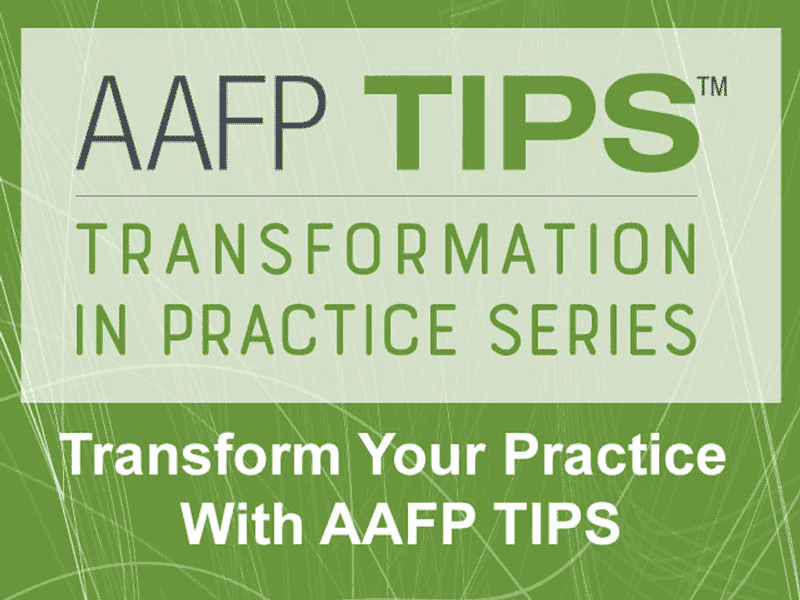New Transformation in Practice Series Simplifies Change
Members Get 50 Percent Discount on AAFP TIPS Topics
May 25, 2018 08:39 am Sheri Porter – An AAFP team has been quite busy of late creating a new series of resources for family physicians that are easy to use and can really make a difference for busy practices.
The first two topics in the AAFP TIPS -- Transformation in Practice Series -- are now ready for purchase at an introductory offer too good to miss.
For a limited time, AAFP members can purchase these products at a 50 percent discount. This makes the empanelment topic $24.50 and the quality improvement topic just $14.50.
These new resources were created as team-based tools designed to make the practice improvement process smoother and easier. More topics will be added as member needs are identified, and each topic toolkit will include
- practice tools and instructional videos that make concepts easy to grasp and implement;
- short, interactive learning courses that can be used individually or in a group setting; and
- customizable presentations to jumpstart group discussions.
Tracey Allen-Ehrhart, manager of the AAFP's Center for Quality, told AAFP News that the intent from the very beginning was to identify topics of importance to family physicians and then create tools to help them move forward in educating team members and implementing new practice processes.
Story Highlights
The Academy has created a new tool for family physicians called the Transformation in Practice Series, or TIPS.
The first two courses, one on quality improvement and another on empanelment, are available to members now for 50 percent off the regular price.
A few family physicians provided input as the products were created, tried them in their practices clinics and gave the AAFP feedback.
"We're giving them actionable tools with the right amount of education to enable implementation," said Allen-Ehrhart. "We want members to take these tools, tailor them to fit their practice situations and use them."
It's important to note that these resources already have been vetted by a few family physicians.
"Early in the process, we identified some family physicians to give us input on what they need for practice improvement and how we could make a product that was useful to them," said Allen-Ehrhart.
After completion of the TIPS on quality improvement and empanelment, some of those same AAFP members reviewed the live products -- giving them a test run and offering feedback for future iterations.
Physician Reviewers Pleased
Lindsay Botsford, M.D., of Houston, is chair of the Academy's Commission on Quality and Practice (CQP). She told AAFP News that most other resources on empanelment "are not geared to reality." She said instructions tend to be long, theoretical and dependent on technology.
The TIPS empanelment topic is different, because "it includes not only a practical summary of background and theory, but actionable tools so you can translate the theory into practice without needing a large staff to assist."
Botsford said the quality improvement topic has been a hit in her residency program.
"As residency faculty, we have used various approaches to teach quality improvement. For residents, creating run charts always seemed like a task that required extensive Excel skills.
"This module helps to demystify the process, and show how QI tools can actually be helpful to demonstrate change in practice. We used the tools in the module to demonstrate how we improved our patient satisfaction scores with visuals that were easy to create."
Botsford said topics are broken down into "bite-sized" interactive sessions that include tools and enduring materials.
Scott Dunn, M.D., of Sandpoint, Idaho, and also a member of the AAFP's CQP, reviewed the modules and had this to say: "The newly released TIPS modules are perfect for busy family doctors trying to manage a full schedule and improve their practices." Dunn described the modules as "concise, organized, and on topic with several useful handouts and good examples so you don't have to reinvent the wheel."
Leisa Bailey, M.D., a solo FP from Bonifay, Fla., said she found the resources easy to use and implement. "These will be a valuable tool for physicians interested in practice transformation," she added.
Product Details
Here are a few details about the first two products now available for purchase:
The AAFP TIPS quality improvement topic was authored by Sandy Pogones, M.P.A, a certified professional in health care quality and the AAFP's senior strategist for health care quality. Course components take about 45 minutes to finish. After completion, learners should be able to, among other things,
- relay key definitions,
- understand the importance of quality improvement in practice,
- identify four steps to quality improvement,
- explore data sources available to family medicine practices, and
- use "run" charts to display data that tells the practice's quality improvement story.
The AAFP TIPS empanelment topic was authored Kate Freeman, M.P.H., the AAFP's quality improvement strategist. Total course completion time is estimated at one hour.
After working through the course materials, participants should know how to, among other things,
- explain key definitions,
- understand the benefits of patient panels,
- review the process for creating a patient panel, and
- know how to assess supply and demand for the practice.
This course provides tools to help identify the ideal patient panel size, refine patient panels and provide ongoing panel management regardless of electronic health record (EHR) functionality.
Freeman told AAFP News there is a huge learning gap related to patient panels, yet panels are foundational to providing advanced primary care, and are the first step in addressing continuity of care and risk-stratified care management.
She added this one caveat: "If the EHR doesn't have the capacity to do this, creating and maintaining the patient panel is much more difficult."
